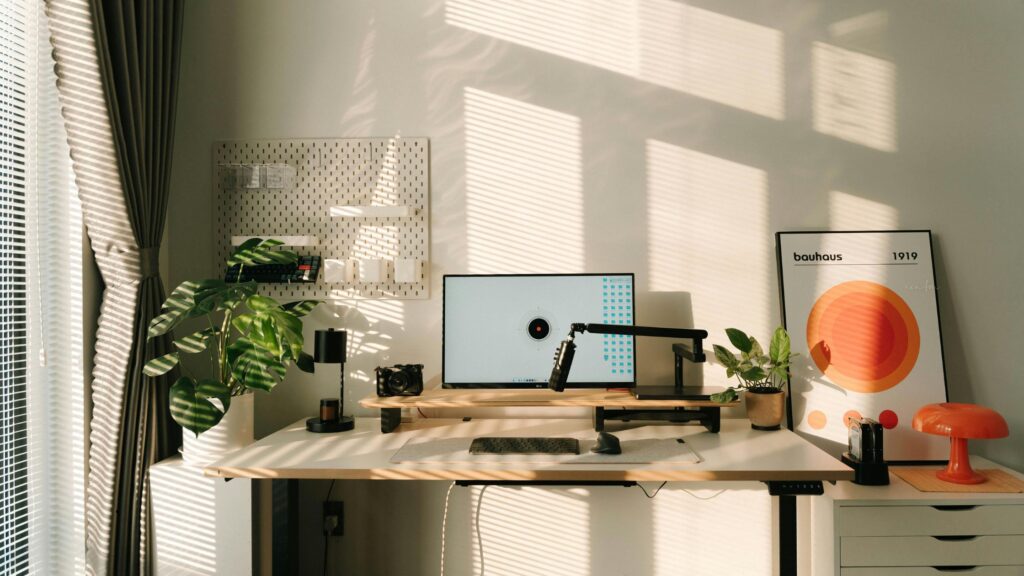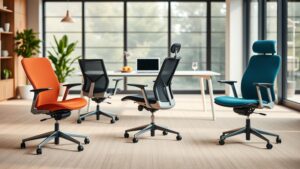Quick confession before we get into the serious stuff—I once spent three straight months testing office chairs after a gnarly back flare-up. Day job, side gigs, late-night emails… my spine was staging a protest. Designers I work with kept pointing me toward Herman Miller because, yeah, stunning. But every ergonomist I trust kept saying, “Try Steelcase. Your back will notice.” They were both kinda right.
Key Takeaways
- Interior designers often chase aesthetics—clean lines, iconic silhouettes—so Herman Miller gets the nod.
- Ergonomists lean on research and adjustment range—Steelcase usually wins for day-long comfort.
- Both brands carved distinct lanes in the market; neither is “wrong,” just tuned for different priorities.
- The right office chair blends posture support, breathability, and adjustability—form and function in balance.
- Know your body, your tasks, and your space. The “best” chair is the one you actually feel good in.
Introduction to Office Chair Selection
Picking a chair isn’t glamorous. But it’s the thing you sit in for thousands of hours. Start with ergonomics—lumbar support, seat depth, and recline behavior—and then match the vibe to your room. If you’re in spreadsheets all day, you want support that follows you, not a stiff plank. If you’re in design reviews, looks matter too. I always test in 20–30 minute chunks and come back later—how it feels on hour six is the truth.
When clients ask where to begin, I send them to options like a solid Steelcase office chair to feel how research-backed designs move with your body. That first sit tells you a lot.
The Aesthetic Appeal of Herman Miller
Iconic Designs That Catch the Eye
Herman Miller nails that museum-piece energy—functional art that still works hard. The silhouettes are recognizable from across the room. The finishes? Dialed. I’ve staged offices where the chair became the anchor for the whole palette. If you want a statement that doesn’t scream, this is it. I get why people obsess over Herman Miller chairs—they photograph beautifully and live well.
Integration with Modern Interiors
Minimal spaces, warm woods, textured rugs—Herman Miller pieces slip in cleanly. They’re not just seating; they’re tone-setters. When a client asks for “elevated but not cold,” I’ll pull a short list that includes Herman Miller furniture and build lighting and storage around that silhouette… it just works.
Ergonomic Chairs: A Stepping Stone to Comfort
Importance of Ergonomic Design
Ergonomics is where the real day-to-day payoff lives. You want a backrest that supports your spine, armrests that fit your forearms, and a seat that doesn’t restrict circulation. If your chair fights you, you’ll hunch. That’s why a dependable Steelcase task chair is often my go-to recommendation—easy adjustments and predictable support.
Support and Posture Benefits
When support matches your movement, your posture takes care of itself. Early in my recovery, I learned to dial seat depth and lumbar first, then arm height. Even a basic steel case chair set up right beats a fancy one set up wrong. Minor tweaks, big difference.
Popular Models by Herman Miller
Features of the Herman Miller Aeron Chair
Aeron is popular for a reason—breathable mesh, adjustable lumbar support, and smooth tilt. It disappears under you, which is kind of the point. If you’ve only sat on cushions, the mesh feel is different at first; then your back goes, ‘Oh.’ For many clients, “a good Herman Miller chair” basically means Aeron.
Why the Sayl Chair Stands Out
Sayl’s sculpted back looks delicate but supports well—especially for lighter users or tighter spaces. It’s a strong pick when you want style, airflow, and decent adjustability without going full flagship. Pairs nicely with soft textures and natural light—just a note from recent installs.
Why Ergonomists Trust Steelcase Chairs
Ergonomists love repeatable support: adjustments that hold, backs that move organically, arm pads that actually meet your forearms during typing. In long sessions, that consistency is everything. For teams, it’s even more helpful because one frame can accommodate very different body types.
The Science Behind the Steelcase Leap Chair
Leap’s LiveBack is the real deal—it changes shape as you move, encouraging micro-adjustments instead of frozen postures. If you’re looking for a single-chair solution for mixed tasks, it’s a contender. I often introduce folks to the platform through a classic Steelcase Leap chair test sit, or even phrased as a Leap chair by Steelcase when we’re talking in brand lines—because the mechanism sells itself.
Customizability for Different Body Types
Seat depth, lumbar tension, synchronized tilt—these let you fine-tune fit instead of forcing one posture. If you prefer a more supportive back feel and a refined recline, the Steelcase Leap chair V2 is often the sweet spot. Prefer a lighter aesthetic? I’ve spec’d the Steelcase Leap V2 chair with a platinum base in bright offices and it looks right at home.
Comparative Analysis: Herman Miller vs. Steelcase
Design Philosophy Differences
Herman Miller leans into sculpture and color stories—pieces that feel curated. Steelcase leans into motion science and durability—pieces that quietly outlast your schedule. Neither approach is “better,” just different bets about where value lives.
Functionality Versus Aesthetics
If your day shifts from deep work to calls to quick sketches, Steelcase’s functional focus is right on target. If your space doubles as client-facing or creative staging, Herman Miller’s visual polish wins. Honestly, many studios run both—right tool, right spot.
Key Ergonomic Features in Steelcase Chairs
Adaptive Technology in Steelcase Leap
LiveBack for spine tracking, flexible seat edge to reduce leg pressure, multi-way arms so wrists aren’t hovering—these details add up during long days. It’s not flashy; it just prevents the little aches that slow you down.
Environmental Sustainability in Design
Recycled content, transparent material disclosures, long lifecycles—good for the planet and budgets. The best sustainability story is durability. Fewer replacements. Less waste. Simple.
How Interior Designers Utilize Herman Miller
Creating Cohesive Workspaces with Style
Designers often start the mood board with the chair, then layer in texture and lighting. Herman Miller pieces anchor minimal rooms without making them sterile. Easy to style, easy to live with.
Client Impressions and Brand Recognition
Clients notice craftsmanship. They remember names. I’ve seen a well-placed piece of Herman Miller office furniture change how people feel about a space the second they walk in—quiet confidence.
Herman Miller Model
| Herman Miller Model | Key Features | Client Appeal |
| Aeron Chair | Breathable mesh, adjustable lumbar, smooth tilt | Trusted comfort and posture support for long sessions |
| Sayl Chair | Lightweight frame, flexible back, striking silhouette | Modern look with solid ergonomics for compact spaces |
Ergonomists’ Perspective on Comfort in the Workplace
The Default to Ergonomic Performance
Ergonomists don’t chase a vibe—they chase repeatable outcomes. They want adjustability that sticks, and support that follows. Less pain, more energy. Simple math.
Relationships Between Health and Productivity
Comfort isn’t a luxury here; it’s throughput. When your chair promotes circulation and maintains neutral posture, your focus holds longer. Meetings run cleanly. Deep work actually happens.
Chair Features
| Chair Features | Impact on Health | Effect on Productivity |
| Adjustable Height | Helps maintain neutral posture and wrist alignment | Reduces fidgeting, supports task switching |
| Lumbar Support | Decreases back strain and fatigue | Improves focus during long sittings |
| Reclining Function | Encourages movement; better blood flow | Extends comfortable work time |
| Breathable Material | Prevents overheating and discomfort | Keeps energy steadier in warm rooms |
Cost Considerations: Choosing the Right Chair
Investment Value of Herman Miller
Higher sticker price, strong longevity, and real resale markets. If you’re set on long-term style and solid ergonomics, it’s a fair investment—especially in client-facing spaces.
Steelcase’s Long-term Solutions
Steelcase builds for heavy use, mixed teams, and long horizons. Slightly more understated, often more adjustable. Value shows up in fewer aches and fewer replacements.
Chair Brand
| Chair Brand | Average Price | Expected Lifespan | Key Investment Value |
| Herman Miller | $1,200 | 10+ years | Iconic design; strong materials; resale value |
| Steelcase | $900 | 10+ years | Research-led ergonomics; robust adjustability |
Customer Feedback: Real-world Experience
Testimonials about Herman Miller Chairs
Clients mention comfort that lasts through long edits and late calls. Also, this matters—their spaces look finished. I’ve had multiple folks tell me guests comment on the chair before the art on the wall.
How Steelcase Fits into Daily Use
Teams with long typing hours report fewer flare-ups and less shoulder tension. Adjustments “stick,” so the chair behaves the same tomorrow as it did today. Unexciting… in the best way.
Emerging Alternatives in the Ergonomic Seating Market
Introduction to Humanscale Office Chairs
Humanscale prioritizes minimal controls and automatic balance—ideal for individuals who dislike fiddling with levers. The Humanscale Freedom chair self-adjusts its recline in a way that feels intuitive—sit, move, done.
Exploring Budget Options for Style and Comfort
You don’t have to spend flagship money to get a healthy posture. Select breathable materials, adjustable arms, and a back that accommodates movement. If you lean towards minimalist design, a capable Humanscale office chair can hit the sweet spot without crowding your space.
Conclusion
So—designers love the camera-ready shapes. Ergonomists love the science-backed support. Both are valid. In my own mess of a testing phase, I learned to match the chair to the task and the room. If you need a safe, reliable daily driver, start with Steelcase. If you want a piece that also elevates the space, start with Herman Miller. And mix when that makes sense. Real life’s messy. Your setup can be smarter.
About Madison Seating
Madison Seating curates ergonomic office furniture for homes and teams—think recognizable brands, sensible pricing, and fast ways to compare configurations. If you’re building a workstation from scratch or upgrading one chair at a time, their catalog makes it easy to filter by features you’ll actually feel.
FAQ
What makes Herman Miller chairs unique?
Iconic forms, strong materials, and breathable seating that ages well. Great when you want your chair to look as considered as the rest of the room.
Why do ergonomists prefer Steelcase chairs?
Adjustments and motion science. Leap and peers track your movement and keep support under you throughout the whole day.
Are Humanscale office chairs a good alternative?
Yes—simpler controls, automatic balance, lighter visual footprint. Easy to live with if you’re not into tweaking settings.
How do I choose the right office chair for me?
Match chair to task length and body type. Prioritize lumbar, seat depth, and arm adjustability. Then pick the look you want to live with.
What are the differences between the Steelcase Leap V2 and the original Leap chair?
V2’s back support feels more refined, the frame slimmer, and adjustments a touch more intuitive—small changes, noticeable over time.
How long can I expect my Herman Miller chair to last?
With normal care, a lifespan of a decade or more is common. Components and mesh hold up; parts are serviceable.
Do Steelcase chairs help with posture?
Yes—LiveBack, proper arm geometry, and flexible edges encourage neutral positions without forcing you to sit like a statue.
Are there any budget-friendly ergonomic chairs available?
Absolutely. Prioritize breathable materials, real arm adjustments, and a supportive back. You can upgrade later if you need more tuning.
Can I find eco-friendly options in office chairs?
Both brands focus on responsible materials and long lifecycles. Longevity is the simplest path to sustainability—buy once, use for years.



